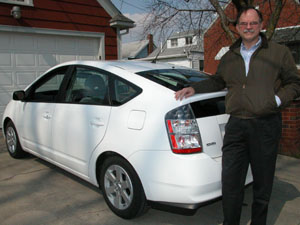By Shelley Grieshop
sgrieshop@dailystandard.com What do you get when you combine a gas engine and an emissions-free electric motor?

Answer: A pollution-conscious, fuel-efficient vehicle that laughs at today's skyrocketing gasoline prices, says hybrid car owner Craig Klopfleisch.
"My wife and I figured with gas at $2 per gallon ... we'll save over $1,000 each year," says Klopfleisch of Celina.
The former Celina mayor purchased his roomy 2004 Toyota Prius in May from a Lima dealership. He currently averages about 45 miles per gallon on regular gasoline. Toyota manufacturers boast a possible 60 mpg with the 4-cylinder Prius.
Unlike all-electric vehicles, the combination gas engine and electric motor hybrid never needs recharging from an external electric power source -- it recharges itself when running. "No, we don't plug it in at night," he laughs, adding he answers that question frequently from neighbors, friends and curious strangers.
The nickel-metal hybrid battery used in most hybrid vehicles came with a six-year/100,000 mile warranty and has proven longevity, according to Consumer Reports magazine. And despite misconceptions, hybrids like the Prius reach the same high speeds as other midsize cars, going from 0 to 60 mph in about 11 seconds.
The Prius is one of several hybrid vehicles on the market today that are powered by gasoline and other types of energy. As auto makers look for ways to rely less on fuel and to clean up the environment, hybrid vehicles have become increasingly popular.
How does it work? At low speeds, the car is powered by the electric motor with the gas engine off. That is why the best gas mileage for this type of vehicle occurs during city driving. During normal driving it mainly uses the 11.9-gallon gasoline engine that charges the vehicle's battery pack. At full acceleration it uses both electric and gasoline.
Deceleration (such as braking) regenerates the kinetic energy from the front wheels to produce electricity to recharge the battery pack -- virtually empowering itself.
A 4-by-6-inch monitor built into the Prius' dashboard shows the driver the power source(s) being used at all times, as well as the current miles per gallon.
Klopfleisch claims he's a "bit of an environmentalist," even though his other family vehicle is a gas-guzzling Ford Explorer. But there was something about a hybrid car that intrigued him and led him to buy the pristine-white automobile that has so far stood up to everything the manufacturer touted, he adds.
Last summer he and his wife, Kay, took the aerodynamic car all the way to the top of Pike's Peak in Colorado -- 14,000 feet above sea level.
"No problems," he proudly adds.
The electric/gas-powered vehicles aren't easy to find locally but can be ordered from most dealerships. A little higher than other vehicles of the same size, the base price for most midsize hybrids is $20,000. A top-of-the-line Toyota Corolla lists for less than $18,000. Hybrid SUV's are gaining in popularity, and a minivan prototype will debut in 2007.
Unfortunately, there are fewer choices in color and interior design with hybrids than other vehicles.
To entice prospective buyers, Uncle Sam offers this bonus: hybrid drivers are eligible for a $2,000 tax deduction until 2006 when the deduction may drop to $500.
Klopfleisch and his wife waited five months for their car, which came loaded with high-tech options, including a global positioning system and a keyless entry and ignition.
The car's quiet idle has the couple periodically tapping their horn as they drive through parking lots.
"One thing we've learned is it's so quiet, people don't hear it and walk right out in front the car," he adds.
Hybrids also appear to have great resale value, he says.
"I know we're happy with ours," Klopfleisch says. "And as gas prices climb, I don't look around to see which (gas) station will save me a few extra cents. It just doesn't make that much difference anymore." |

